Introduction to Agroecology Has Begun

News and Updates from the Institute for Agroecology
Introduction to Agroecology Has Begun

ALC’s Coffee farmer Cooperative Partners share experiences of diversification project at Specialty Coffee Association (SCA) Expo and UVM
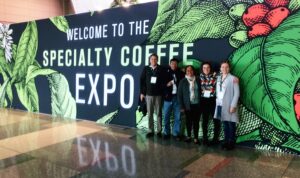
Leticia Velasco and Rigoberto Hernández Jonapá, collaborators from the CESMACH coffee cooperative (based in Chiapas, MX), visited the Northeast in mid-April. ALC members Martha Caswell, Janica Anderzén and Ernesto Méndez met up with Lety and Rigo in Boston, where the Specialty Coffee Association (SCA) held its annual Expo, from April 11-14. The team presented findings from Smallholder Coffee Diversification Project at a panel and participated in an academic poster session.
The Expo brings together a diversity of actors in the specialty coffee sector to share the latest trends in the coffee industry. However, we and our colleagues noticed that key contributors to the coffee value chain were largely missing – the smallholder producers. While vendors were showcasing expensive machinery and baristas were competing to make the best latte, the producers were visible mainly in pictures on banners and in brochures. Lety noted that although it was interesting to see the Expo, she was a little disappointed with what she saw. “Buyers are not looking for friends, they are only interested in our product”, she commented after the Expo.
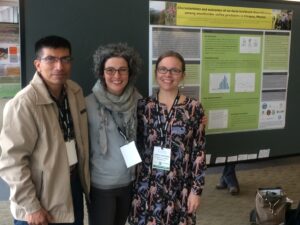
Despite these feelings of disillusionment, we were heartened by the words of Todd Caspersen, Director of Purchasing and Production at Equal Exchange, who joined us as a panelist. Todd shared that he sees this kind of research project, with multiple partners, as an interesting way for Equal Exchange to engage outside of the “transactional relationship” with farmer groups. He sees this as very important and discussed the importance of “building our muscles” as we look for solutions to challenges, such as climate change, which threaten the future viability of coffee production. The team also enjoyed moments of solidarity with other smallholder producers, as we learned about the current campaign being carried out by members of the Símbolo de Pequeños Productores (SPP – the small producer symbol). The focus of this campaign is setting a price for coffee that covers costs of production and provides some profit to producers. The difference between the SPP and other labels (i.e. organic or Fair Trade) is that the prices and the standards are set by representatives of smallholder cooperatives themselves, rather than by people and organizations based in consuming countries in the global north.
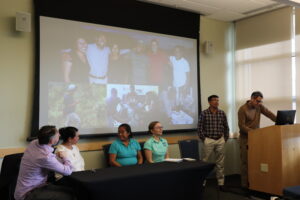
After the Expo, the team headed to Burlington. ALC hosted a panel at UVM with participation from Ernesto (ALC), Rigo and Lety (CESMACH), Marcela Pino (Food 4 Farmers) and Nate Van Dusen (Brio Coffeeworks), where panelists discussed their perspectives on livelihood diversification for smallholder coffee farmers. The guests also shared their experiences at an ALC lab session, and in an event hosted by the Brio Coffeeworks at their facilities. In addition, Janica (ALC PhD candidate) shared her research in the diversification project at the UVM student research conference.
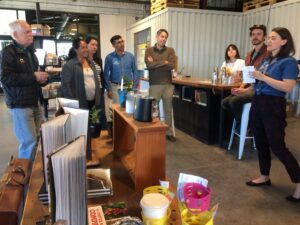
All of these events presented great opportunities to learn about the producers’ experiences and perspectives, and to discuss how researchers and NGOs can support farmers’ organizations in implementing diversification strategies that can help farmers face challenges such as low prices, climate change, and food insecurity.
– Janica Anderzen, ALC PhD Candidate at University of Vermont
Ernesto Mendez Joins International Researchers, Farmers, and Activists in Brazil
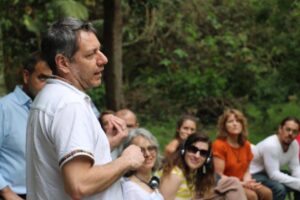 ALC Director and PSS Chair, Ernesto Mendez, traveled to Florianópolis, the capital city of Santa Catarina, Brazil, to attend a leadership team meeting of the Collaborative Crop Research Program (CCRP), of the McKnight Foundation. The week-long meeting brings together staff and researchers from the 3 regions of the CCRP in the South American Andes, West Africa and East and South Africa. As part of the visit the CCRP team met with CEPAGRO, an agroecology focused organization, based at the Universidade Federal de Santa Catarina (UFSC). CEPAGRO’s work aligns well with the ALC’s Participatory Action Research (PAR) approach. The gathering at the UFSC, brought together 30 professionals and students from the US, Brazil, Canada, El Salvador, Ecuador, Kenya, Germany, Tanzania, Burkina Faso, Peru, and England.
ALC Director and PSS Chair, Ernesto Mendez, traveled to Florianópolis, the capital city of Santa Catarina, Brazil, to attend a leadership team meeting of the Collaborative Crop Research Program (CCRP), of the McKnight Foundation. The week-long meeting brings together staff and researchers from the 3 regions of the CCRP in the South American Andes, West Africa and East and South Africa. As part of the visit the CCRP team met with CEPAGRO, an agroecology focused organization, based at the Universidade Federal de Santa Catarina (UFSC). CEPAGRO’s work aligns well with the ALC’s Participatory Action Research (PAR) approach. The gathering at the UFSC, brought together 30 professionals and students from the US, Brazil, Canada, El Salvador, Ecuador, Kenya, Germany, Tanzania, Burkina Faso, Peru, and England.
The history of agroecology in Brazil is a rich one, based not only in land stewardship and diversification of farmer livelihoods, but also in the struggle to maintain access to land. “In order for Agroecology to happen, the democratization of access to land for the people of the countryside and of the city is necessary,” said Eduardo Rocha of CEPAGRO.
Throughout the afternoon, leaders and representatives from regional and local communities, indigenous communities, and urban farmers shared their triumphs and struggles employing agroecology in the face of inequitable access to land and its associated discrimination. Those present included Shirlen Vidal de Oliveira and Helena Jucélia Vidal de Oliveira, representatives of the Quilombo Vidal Martins Community, in Rio Vermelho, Florianópolis; Fábio Ferraz and Bárbara Ventura, of the Amarildo de Souza Commune Settlement, and Cacique Artur Benites and Alexandro and Fábio, of the Guarani community of Aldeia Tekoá vy ‘a, in Major Gercino. Also present were urban farmers Raquel Solange de Souza and Alaércio Vicente Pereira Jr, CEPAGRO research partners Dana James and Evan Bowness of University of British Columbia, and Professor Antonio Munarim, of the Vianei Center for Popular Education.
What stood out to most participants that afternoon was the opportunity for knowledge sharing and collaboration amongst stakeholders of different backgrounds. Urban farmer Raquel Solange reflected on how impactful it was, “to communicate with the people who came from outside and also to know the natives and quilombos, because I have never visited a village or a quilombo. As a social worker I’ve given several lectures, but that theme I owned. And to be there to talk about Agroecology, it was just my personal experience, it was more to put my heart out.”
CCRP members also enjoyed a presentation on direct marketing for family farmers from the Family Agriculture Marketing Laboratory (LACAF). As agroecology advisor of the CCRP, which aims to support access to local, sustainable and nutritious food through collaborative research and knowledge sharing among small farmers, research institutions and development organizations, Ernesto reflected, “Brazil is strong in Agroecology and it is very important to listen to you, the producers and indigenous people. It is very important to learn from the experience in Brazil.”
This blog is based on an article, in Portuguese, by Clara Comandolli de Souza, Journalist at CEPAGRO. The original piece can be accessed here
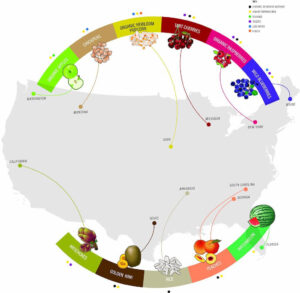 ALC Community member and PhD candidate Alissa White spoke with New York Times reporter Kim Severson and lent some insight for her story about how climate change is impacting our diets. UVM Alum Lily Calderwood is also featured in the article.
ALC Community member and PhD candidate Alissa White spoke with New York Times reporter Kim Severson and lent some insight for her story about how climate change is impacting our diets. UVM Alum Lily Calderwood is also featured in the article.
“…Couple that with mild winters that don’t kill off pests, and unusual weather patterns that don’t bring rain when they should — or bring so much that farmers can’t get into the fields to work or have to battle fungus — and organic berries aren’t such a good bet anymore. “People have really given up on raspberries on a lot of farms,” said Alissa White, a researcher at the University of Vermont who tracks the impact of climate change on Northeastern farms. “Farmers are the kings of risk management. Once every 10 or 20 years we could lose a crop. But if once every three or four, that’s a lot.””
Keep following us here, and on instagram and facebook for further updates on agroecology as a science, movement, and practice.
Image Credit: MSJonesNYC
I came to the United States when I was 18, seeking to get away from the violence of the civil war in my native El Salvador, and thanks to the economic privilege of my family. After several years of career exploration, and also deeper learning and reflection about the social and environmental realities of my country, I chose agriculture. Both my father and grandfather had farmed commercially, among other pursuits, in El Salvador, and I was always drawn to the farms. Along with this interest, I developed a concern for the multiplicity of challenges that smallholder farmers in Latin America, and around the world, face to this day. These range from social and ethnic discrimination, to lack of basic services and/or agricultural technical assistance. A career in international agricultural development, a field that focuses on working with farmers in developing countries, seemed like a great option for me.
At first, my focus was on the science of agricultural production as a means to improve the well-being of farming families. However, as I expanded my studies, I realized that production was only one part of the issue, and that strengthening the livelihoods of farming households requires a broader understanding of the social, political and environmental challenges that they face. While pursuing degrees in Crop Science and Tropical Agroforestry, I found the field of agroecology, which, at the time, was defined as the ‘application of ecological concepts and principles to sustainable agriculture’. This notion made a lot of sense to me, and as the field has evolved over the years, it has remained my passion and my inspiration. The first concrete confluence between agroecology and environmental studies came when I started a PhD at the University of California, Santa Cruz. I joined an interdisciplinary environmental studies program, with a concentration in agroecology. It was here that I first engaged with true interdisciplinary scholarship and challenged myself to deepen my learning in the social sciences. As a teaching assistant, I was working with students majoring in environmental studies with a curriculum very similar to the one we have at UVM. The position that I took at UVM in 2006, which integrated agriculture and environmental studies, was a perfect fit!
In my view, agroecology brings together the strengths of environmental studies to an agricultural context. Both fields share an emphasis on inter/transdisciplinarity, valuing and respecting the knowledge of farmers and indigenous people, and an awareness of social justice and the political economies that affect people and landscapes. In the last decade, researchers, social movements and farmers have embraced agroecology as an approach that can catalyze a transformation towards more sustainable and just food systems. Two key lessons I have learned from over 25 years working in agroecology are: 1) we need to be collaborative and 2) we need to be humble. Both of these qualities are necessary to stay open to an increasing level of complexity, and to find solutions in an inclusive way. I believe there are opportunities to better integrate the fields of agroecology and environmental studies to support the livelihoods of both farmers and eaters, while conserving the ecosystem services of agricultural landscapes.
ENVS students interested in agroecology have a variety of options to engage with it at UVM. The Plant and Soil Science Department (PSS), which I now chair, is in the process of strengthening its agroecology curriculum, reinforcing hands-on and high impact learning practices, as well as changing the major and minor names to Agroecology. We have also integrated the Farmer Training Program (FTP) into PSS, and are seeking for this initiative to have more interactions with the UVM Community. My research group, the Agroecology and Livelihoods Collaborative (ALC), carries out agroecological investigations in Vermont and Latin America, with a long trajectory of work supporting environmental conservation and farmer livelihoods in smallholder coffee cooperatives. We have recently launched a 2-semester ALC Undergraduate Research Fellows Program (see a UVM Communications story about the program here), with a focus on agroecology and Participatory Action Research (PAR). All of these are collaborative initiatives, which have brought together a diversity of faculty, staff and students from PSS, ENVS, UVM Extension and others outside of UVM.
Agroecology can help study and address a range of issues in agriculture, including ecological analysis of practices, options to improve farmer livelihoods, and how researchers and social movements can work together to advocate for better policies. As both an ENVS and PSS professor, I am really looking forward to building stronger partnerships between our growing agroecology initiatives and the Environmental Program’s students, faculty and staff.
–Ernesto

The first cohort of ALC Undergraduate Research Fellows at a farmer partner dinner held in 2018, at Jericho Settlers Farm. From left to right Karen Nordstrom (ENVS Advisor), Nell Carpenter (ENVS ALC Fellow), Allie Pankoff (ENSC ALC Fellow), Lizzy Holiman (Food Systems & Eco-Ag ALC Fellow), Emily McCarthy (ENVS ALC Fellow), Elise Schumacher (Food systems and ALC Fellow) and Ernesto Méndez (ALC/PSS and ENVS).

Picture of a shaded coffee farm in Chiapas, Mexico, owned by a member of the CESMACH cooperative, showing a diversity of land uses and agricultural activities. The ALC has an ongoing project on diversification in Mexico and Nicaragua.
Greetings from the American Association of Geographers Annual Meeting!
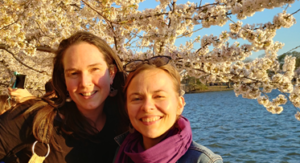
UVM Plant and Soil Science PhD Students Alissa White and Janica Anderzén from the Agroecology and Livelihoods Collaborative presented their work yesterday at the special sessions on agroecology organized by CAWR (Center for Agroecology, Water & Resilience) and ARC (Agroecology Research-Action Collective). The meeting featured emerging research on agroecological transitions and theories of change under the title “Agroecology Now!”. Janica and Alissa presented during the first set of presentations focused on context-specific examples of agroecology initiatives and networks. The rest of the sessions drew in speakers that offered complementary research on opportunities and challenges for making changes at multiple scales in the food system.
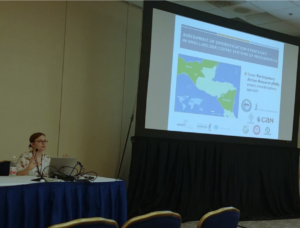
Janica Anderzén shared results from early phases of her research with the CESMACH coffee coop in Chiapas, Mexico. Janica’s research offers new insight into diversification as a livelihood strategy for dealing with the climate and market pressures that contribute to food scarcity in this region. She highlighted the role of beekeeping and subsistence farming to improved livelihood and food security.
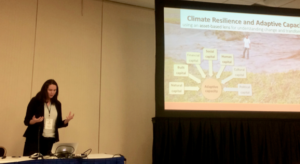
Alissa White presented findings from her research with farmer networks in the Northeastern US. Her analysis identifies networks as key drivers of farmer-led innovation in the region. Based on emerging themes from focus groups, her research also explores the characteristics of networks that support the capacity of farmers to make change in the face of climate change.
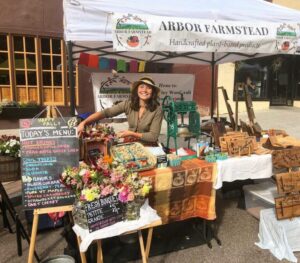
The Farm Between wins 2018 Farmer-Rancher Pollinator Award for US
Nancy and John Hayden were recently recognized by the North American Pollinator Protection Campaign (NAPPC) with the 2018 Farmer-Rancher Pollinator Award for the United States. They received their Award at the NAPPC’s Conference in Washington DC.
Nancy and John steward The Farm Between in Jeffersonville, VT, where they have farmed for the past 26 years. Today, the 20-acre property incorporates organic fruit production, an on-site nursery with native and pollinator-friendly plants, and a 14-acre pollinator sanctuary buzzing with diversity. In addition to farming, Nancy gains inspiration from the surrounding agroecosystem for her writing and artwork. Some of her fiber/fabric creations feature pollinators and the challenges they face, such as those in her “Pollinators in Peril” series. John, a trained entomologist, conducts research on-farm, often in collaboration with academic institutions and non-profits. He also advocates for pollinators at the policy-level and presently serves on the Vermont Pollinator Protection Committee. In 2007, Nancy and John founded the international non-profit, Seeds of Self-Reliance, and more recently developed Pollinator Pathways here in Vermont. Both efforts seek to promote pollinator diversity and habitat creation with emphasis on pollinators’ role in sustainable food systems.
The ALC is fortunate to have had the opportunity to build a long-term partnership with Nancy and John as research collaborators on both local and international projects. The Farm Between has served as a host to UVM agroecology courses for many years and the constantly evolving landscape remains a beloved exploratory space for students. Their passion for pollinators and commitment to engaging in agroecology as a science, practice, and movement are inspiring to many. Kudos to John and Nancy on receiving the 2018 Farmer-Rancher Pollinator Award – certainly well-deserved!
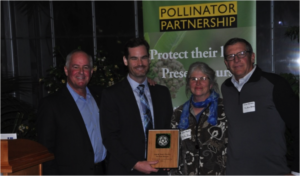
Nancy and John Hayden accepting the 2018 United States Farmer-Rancher Pollinator Award at the NAPPC Conference, Photo Credit: NAPPC
After a few technical difficulties, the ALC website is back up and running. Stay tuned for posts from students, faculty, staff, and collaborators including:
The Farm Between Wins the 2018 United States Farmer-Rancher Pollinator Award
The ALC Fellows Program
2018 ALC Publications
An Interview with ALC PhD Candidate
and more…
From the IPES-Food Website:
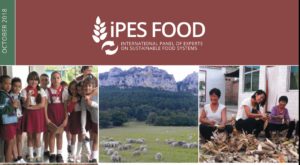
15 October, 2018 (Rome, Italy) – It is possible for communities, regions and whole countries to fundamentally redesign their food and farming systems – but doing so requires changes in the way communities envision their food systems, the way knowledge is shared, the way that food systems are governed, and the values underpinning them.
This was the message from IPES-Food’s new report, ‘Breaking away from industrial food and farming systems: Seven case studies of agroecological transition’, released on October 15th, 2018.
The case studies follow on from IPES-Food’s 2016 report, From Uniformity to Diversity, which identified the vicious cycles locking industrial food and farming systems in place, despite their severe impacts on human health, economic and social well-being, biodiversity, and climate change.
The case studies provide concrete examples of how, in spite of these barriers to change, people around the world have been able to fundamentally rethink and redesign food systems around agroecological principles.
Steve Gliessman, lead author of the report, said: “The case studies show that change doesn’t always start in the field. Transition can be kick-started by community-building activities, farmer-researcher partnerships and even by external shocks that make people question the status quo.”
Political Agroecologist Dr. M. Jahi Chappell delivered an address to over 80 people at the University of Vermont (UVM), last Friday September 14. Jahi is a widely recognized agroecologist, with a diverse trajectory that includes being a professor at Washington State University, an analyst at the Institute for Agriculture and Trade Policy, and now a senior researcher at the Centre for Agroecology Water and Resilience (CAWR), at Conventry University, England. The talk focused on Jahi’s recent book, Beginning to End Hunger, which documents his experience on innovations and lessons to end hunger in Belo Horizonte, Brazil. The analysis also examines how this case study can inform similar work in other regions. His deeply transdisciplinary approach touched on issues of equity, policy and the need for academics, policy-makers, activists and social movements to work together to seek effective solutions to the pervasive issues of hunger and food insecurity. The talk was co-sponsored by the Plant and Soil Science Department, the Agroecology and Livelihoods Collaborative (ALC), the Gund Institute for Environment, the Food Systems Graduate Program and the Environmental Program, all from UVM (click on images to enlarge).
Today (August 31), was the first farm day for 3 teams of Advanced Agroecology (PSS/ENVS 212) students, as they headed out to Jericho Settlers Farm, UVM Catamount Farm/Farmer Training Program, and the Farm Between. Students were going to meet their farmer partners, get an overview of the farm and start helping out by doing work as part of their service learning. For the first time since the beginning of this course in 2008, each of the 5 farm teams is being led by an ALC undergraduate research fellow, who will be helping support all work on the farm, as well as the participatory action research (PAR) activities that are also a new component of the course. The other three farm partners are , Bread and Butter Farm and Digger’s Mirth Farm. This year, the fellows are from the following UVM programs: 2 Environmental studies majors, 1 Food Systems major, 1 Ecological Agriculture and Food Systems double major, and 1 Environmental Science major (click on photos to enlarge).
The ALC team recently concluded the first offering of PSS 311: Introduction to Agroecology, the first course of our Certificate of Graduate Study in Agroecology (CGSA). We had a great crew of 11 participants, from the U.S., Canada, Mexico and Puerto Rico. The course is a hybrid, with 3 weeks online, and 1 week face to face. The face to face week was spent working and connecting with ALC Vermont partners, including The Farm Between, Diggers Mirth Farm, Bread and Butter Farm, the Intervale Center, UVM Catamount Farm & Farmer Training Program and the Vermont Community Garden Network (VCGN). We connected over great local food from Blossom, Barrio Bakery, Bread and Butter burgers, and different vendors at Summervale, ArtsRiot South End food trucks and the Mendez-Nordstrom household. We are grateful for all the learning with the first CGSA cohort, and very excited to launch the remaining courses of the first full CGSA offering. Below we provide some images of a full and meaningful week (click on pictures to enlarge).
Adelante !!!
We are seeking a highly organized, personable, tech-saavy and motivated individual to join our team as a program administrator. Full job description is below. If you are interested, please send a cover letter, resume and contact information for 3 references to agroecol@uvm.edu
Position Summary
The Agroecology and Livelihoods Collaborative (ALC) is a community of practice within the Department of Plant & Soil Science (PSS) at the University of Vermont, which utilizes an approach grounded in agroecology, participatory action research (PAR), and transdisciplinarity. Our goal is to better understand and seek solutions to the issues facing our food system. The ALC program administrator reports to the faculty director and research & outreach coordinator, and works closely with the core team (faculty director, research and outreach coordinator, and educational coordinator), to manage communications and internal operations for the ALC, and to plan and implement the ALC’s research and educational initiatives. The program administrator will also provide some support to the PSS program, and will be a point of contact for ALC students, and other collaborators both within and outside of the university.
Responsibilities
The ALC program administrator contributes to fundraising efforts for the ALC (15% effort). This includes:
Position Requirements:
Preferred:
This is a part-time position, 20 hours per week, at $18 per hour. We regret that we cannot provide benefits.
In mid July, ALC director Ernesto Méndez joined Maria Rosa Yumbla and Ronald Herrera, PhD students at the Universidad Pablo de Olavide (Spain), at the Andes Community of Practice (CoP) meeting of the Collaborative Crop Research Program (CCRP), in Arequipa, Perú. Yumbla and Herrera are conducting PhD studies in agroecology, and working on an ALC project on farmer research networks and participatory action research (PAR) with smallholder peanut farmers in Bolivia. At the CoP, Yumbla and Herrera presented their PAR work with farmers on developing an ‘agroecological x-ray’ to assess the state of their farms and discuss a transition towards agroecology. The term agroecological x-ray was coined by a participating farmer. The CoP included about 14 projects from Peru, Ecuador and Bolivia supported by the CCRP, a program funded by the McKnight Foundation.
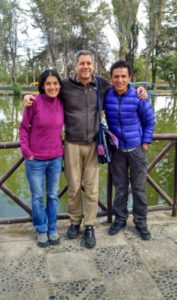
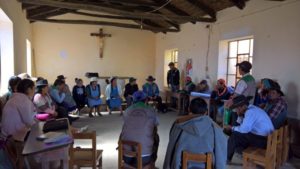
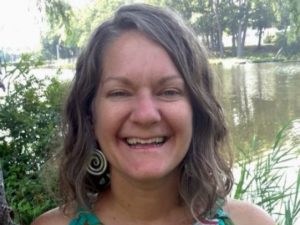 Katie Goodall, who did her Ph.D. with the Agroecology and Livelihoods Collaborative (ALC), in the Plant and Soil Science Department, at UVM, carries on strong with agroecology teaching. Now an Assistant Dean at the School for Field Studies, Katie is returning to the University of Michigan’s Biological Station to teach Agroecology. She was a teaching assistant at the station, for several years, while pursuing her master’s degree at the University of Michigan. Congratulations y Adelante (Forward), Katie ! Read more here: https://lsa.umich.edu/umbs/news-events/all-news/search-news/katie-goodall-returns-to-umbs.html
Katie Goodall, who did her Ph.D. with the Agroecology and Livelihoods Collaborative (ALC), in the Plant and Soil Science Department, at UVM, carries on strong with agroecology teaching. Now an Assistant Dean at the School for Field Studies, Katie is returning to the University of Michigan’s Biological Station to teach Agroecology. She was a teaching assistant at the station, for several years, while pursuing her master’s degree at the University of Michigan. Congratulations y Adelante (Forward), Katie ! Read more here: https://lsa.umich.edu/umbs/news-events/all-news/search-news/katie-goodall-returns-to-umbs.html
The ALC is pleased to invite applications for the second cohort of the Agroecology & Livelihoods Collaborative (ALC) Undergraduate Research Fellows Program (ALC Fellows Program). The ALC Fellows Program provides upper division (3rd year +) students the opportunity to develop skills and gain knowledge in agroecology and participatory action research (PAR) to become integral team members of ALC projects. Please note, applications for the next cohort of undergraduate fellows are due: Friday, April 13th, 2018. For more information, check out: www.uvm.edu/agroecology/fellows
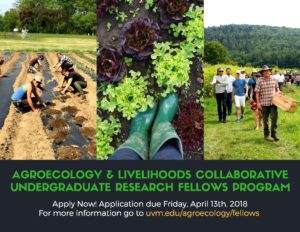
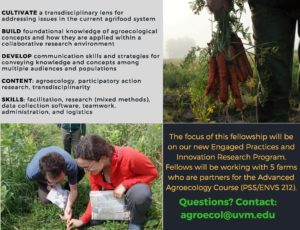
In his role as agroecology advisor to the CCRP, ALC director Ernesto Méndez joined the CCRP’s West Africa CoP for their annual meeting, held in Niamey, Niger, February 26-March 3. This year, the CoP brought together 14 research projects, which are being implemented in Niger, Mali and Burkina Faso. Project themes range from improving varieties of sorghum and millet, to the use of agroforestry, and the co-creation of agroecological knowledge between farmers and scientists. In addition to learning and interacting with participants, Méndez led a workshop on ‘Frameworks to Assess Agroecological Perfomance’, where participants applied the use of agroecological frameworks in their projects. He was joined by ALC collaborator Steve Brescia, Executive Director of Groundswell International, who discussed agroecology as a science, a movement and a practice. During the workshop, participants engaged with different agroecological frameworks and principles by project, and discussed actors, opportunities and recommendations, by country, in terms of agroecological science, movement and practice.
In January, ALC Master’s student, Alissa White, presented at the American Meteorological Society Annual Meeting in Austin, Texas. White writes, “I joined about 2,000 people who are mostly weather scientists and climate physicists for their 98th annual meeting. This long-standing scientific community made the theme for this year’s meeting “Transforming communication through co-production”. There was a clear acknowledgement that the science they have been working on for so long is now extremely politicized by climate deniers. This leads to many challenges in communicating climate science, but social science research which indicates that co-producing climate knowledge overcomes those communication challenges. So these traditional scientists are aware that they need to learn how to invite stakeholders into the research process.”
Here is a link to her presentation titled, “Bridging the Climate Information Usability Gap in Agricultural Communities“. Follow the link to view her abstract.